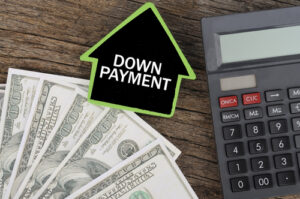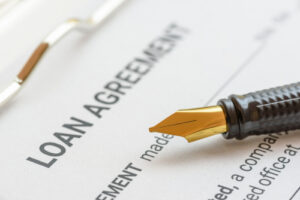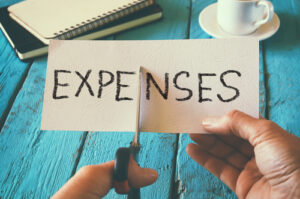Tips to Save for a Down Payment for a Rental Property
Buying real estate is a big decision, even for seasoned investors. After all, large purchases like cars or homes require a ton of money, even if you finance the purchase with a loan. In fact, to get a loan, you’ll often need to save for a down payment. In today’s article, we’ll discuss why you need a down payment and helpful strategies to save for your next investment.

Contents of This Article:
- What Is a Down Payment and Why Do You Need One?
- Average Amount You’ll Need to Save for a Down Payment
- Benefits of a Large Down Payment
- Strategies to Help Save Money
- Find a Local Lender to Finance Your Investment
What Is a Down Payment and Why Do You Need One?
A down payment is the amount of money that’s paid upfront for a large purchase, like a car, home, or other investment. For instance, suppose you want to buy a home for $200,000. To get a loan to finance the purchase, you’ll likely need a down payment.

The higher your down payment, the lower your monthly loan payments will be. Additionally, the more you put down, the less you’ll need to borrow, and the less you’ll pay in interest over time.
Most lenders require a down payment because they’re taking a risk by lending you money. If you stop making payments, they may not make back the money that they lent you. As such, putting money down helps reduce the risk for the lender in a few ways. For instance, it represents your dedication to your investment and lowers the amount that the lender needs to give you for the purchase.
Average Amount You’ll Need to Save for a Down Payment
Whether taking out a mortgage loan or using private money financing, you must save for a down payment. However, the amount you’ll need to save for a down payment differs depending on your purchase.

For most home purchases, you’ll need anywhere from 5% to 30% of the total purchase price upfront. Then, you’d either take out a mortgage loan, hard money loan, or another type of loan to finance the rest of your investment.
Generally, you’ll need 20% of the purchase price down for a mortgage loan. However, it may differ for other loan types, such as hard money loans. Since hard money loans have different terms and conditions, you may need a larger down payment, sometimes closer to 30%.
Ultimately, your down payment may depend on several factors, like your budget, goals, and type of investment. Next, we’ll review the benefits of saving for a large down payment.
Benefits of a Large Down Payment
In some cases, you don’t need a significant down payment. However, while it gives you more money for emergencies or other living expenses, it increases your loan payments and interest rates. Ultimately, there are several benefits to saving for a significant down payment when taking out a loan. Here are some of the main reasons to save for a sizeable down payment.
Lower Rates and Premiums
Generally, lenders like to see a significant down payment since it lowers the risk you pose to them. After all, the larger your down payment, the less you pay each month for the loan principal and interest.

For instance, if you borrow $200,000 on a 5% interest rate loan, you’ll pay $10,000 in the first year. However, if you put down more money and only borrow $160,000, you’ll only pay $8,000, saving $2,000 in the first year.
Smaller Monthly Payments
Just as you’ll pay less interest over time with a larger down payment, it also makes your monthly payments smaller. Since you won’t need to borrow as much, you won’t have to pay off as much of the loan each month. Ultimately, the larger the loan amount, the larger your monthly payments will be.
Avoid Mortgage Insurance
If you’re using a traditional mortgage loan, making a sizeable down payment can help you avoid paying private mortgage insurance (PMI). However, when you put down less than 20% of the loan amount, most lenders require private mortgage insurance, which reimburses them if you don’t make a loan payment.
Strategies to Help Save Money for a Down Payment
Saving thousands of dollars for a down payment takes a lot of time and discipline. For instance, you may have to sacrifice and cut out unnecessary spending to achieve your investment goals. If you struggle with saving money and want to save for a down payment, check out some of these helpful strategies.
Plan How Much You Need to Save
The first step to saving for a down payment is knowing how much you need and how much you can afford. Once you review your budget and how much you can afford to pay each month, you’ll want to estimate a down payment amount.

You can estimate a down payment goal using your budget or pre-approval amount. So, if your home budget or pre-approval amount is $200,000, you can plan to save anywhere from 5% to 20%, which would be $10,000 to $40,000.
Transfer Savings to Another Account
One of the easiest ways to save money is to put it into an account where it’s not accessible. For instance, creating a high-yield separate savings account can allow your money to multiply and keep it out of your hands until you need it.
Automating your savings is a helpful strategy to help achieve your goal down payment amount. If you don’t have to think about putting money away, you can quickly achieve your goal without putting much thought into it. Ultimately, the more you automate your savings, the easier it is to save.
Boost Your Income
Despite having a budget, you may find it still challenging to put money aside each month toward a down payment. As such, one of the most straightforward ways to save more money is to make more money. While it’s easier said than done, there are a few potential ways to boost your income.
For instance, if you’ve shown excellent performance at work, you could consider negotiating a raise. Other options include taking on a second job, selling items you no longer use, or looking at higher-paying jobs.
Cut Unnecessary Spending

Even if you increase your income, you’ll want to cut unnecessary spending if you save for a down payment. After all, if you want to increase your savings, your income needs to be more than your expenses. Eventually, you’ll be ready to finance your next real estate investment.
Consider looking at your current spending habits and deciding what you can eliminate. This may mean dedicating all your income solely to necessities like basic living expenses and cutting out everything else you usually spend. Then, although you may miss your morning coffee runs or lunch takeout, it’ll be worth it when you finance your long-awaited investment property.
Reduce Your Debt
If you have high-interest debts already, it could make it harder to pay for a new investment. After all, high-interest rates can put a massive dent in your finances. As such, paying off your debts before saving up for a down payment is smart.
After all, paying off your debt first can increase your credit score, allowing you to get better loan terms. Additionally, you can save more of your paychecks without worrying about old high-interest debt for your new investment.
Find a Local Lender to Finance Your Investment
If you’re looking for a loan for a new investment property, you’ll want to start saving for a down payment as soon as possible. Then, once you have a large down payment, you’ll want to find a lender to work with. Luckily, there are many lenders to choose from, whether you want to explore a conventional, government-insured, or hard money loan.
However, if you’re looking for fewer requirements and quick approval, consider Maryland Hard Money Lenders for your next investment property loan. Our qualified professionals work quickly and diligently to ensure you get the amount you need for your investment. Contact Maryland Hard Money Lenders today to learn more about our terms and apply for a hard money loan.



